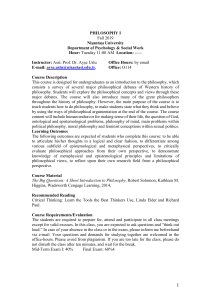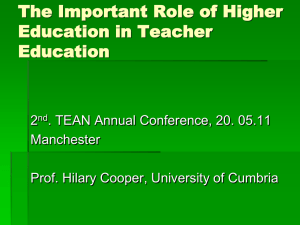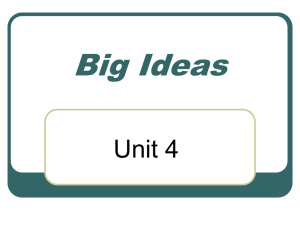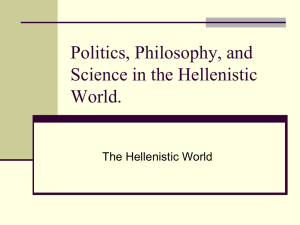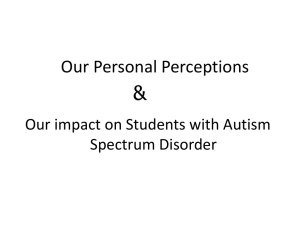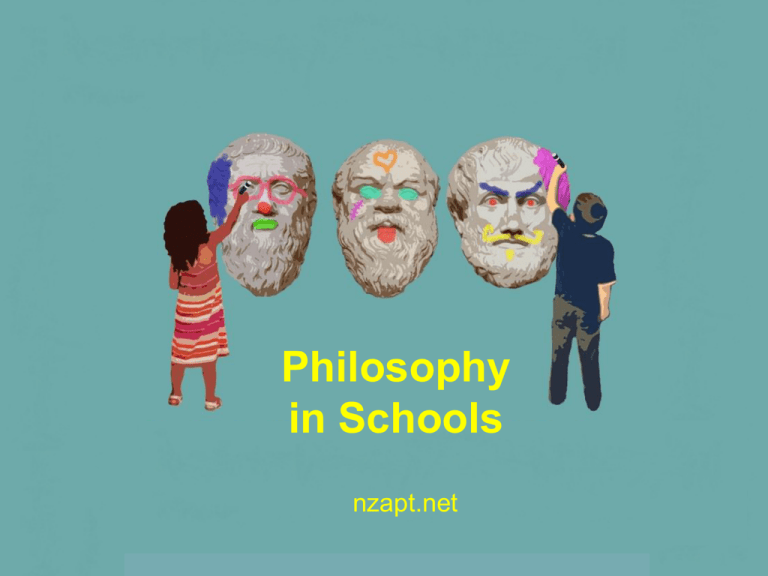
Philosophy
in Schools
nzapt.net
Overview:
what we do & what is missing
• Is philosophy in schools a good idea?
• What has this got to do with University
Philosophy?
• What is secondary school Philosophy
like?
• a. What is NCEA?
• b. How does NCEA Philosophy work?
Is philosophy in schools
a good idea?
“For it is owing to their
wonder that [wo]men begin
to philosophize”
- Aristotle, Metaphysics
What is NCEA?
• Three levels of NCEA Achievement Standards:
levels 1 to 3 in years 11 to 13 (form 5-7)
• At each level, students must achieve a certain
number of credits to gain an NCEA certificate.
• Assessments are known as Achievement
Standards.
• 80 credits are required at any level
Level 3 – Income Inequality
Social Studies AS91600: Examine a campaign of social
action(s) to influence policy change(s) rights.
Neoliberal economics and growing
divide between New Zealand’s
poorest and wealthiest
Social Studies AS91600: Examine a campaign of social
action(s) to influence policy change(s) rights.
1. Describe the issue from different points of view, values and
perspectives
2. Explain the aims of the campaign
3. Explain of the differing reasons for individuals and/or groups
involvement in the campaign
4. Explain the reasons for individuals and/or groups selecting
the actions within the campaign.
5. Critically evaluate the effectiveness of the campaign
Describe the issue from different points of
view, values and perspectives
• Michael Sandal’s What’s the right thing to do?
• Robert Nozick on Taxation: Anarchy, State, and
Utopia
• Diogenes of Sinope: Cosmopolitanism
• Pierre Bourdieu: cultural/social reproduction
• Peter Singer - Practical Ethics
• Tom Regan: Regan’s Lifeboat,
• Critiquing Capitalist and Neoliberal ideology (Karl
Marx)
Philosophy free zones
• Explain the aims of the campaign
• Explain of the differing reasons for individuals and/or
groups involvement in the campaign
• Explain the reasons for individuals and/or groups
selecting the actions within the campaign.
• Critically evaluate the effectiveness of the campaign.
Mental Health and Addiction Support
22836 Analyse the application of ethical values for mental health support
work
Health
23392 Describe ethical behaviour in a health, disability, or community setting
91464 Analyse a contemporary ethical issue in relation to well-being
Religious Studies
90818 Describe the application of the key ethical principle(s) of a religious
tradition to an issue
90822 Explain how a contemporary social action derives from the ethical
principles of a religious tradition
90826 Analyse the response of a religious tradition to a contemporary
ethical issue
Key Competencies
1.
2.
3.
4.
5.
Thinking
Relating to others
using language, symbols, and texts
managing self
participating and contributing
2nd: Refined NZ Curriculum
Philosophy as a trans-disciplinary non-isolable domain
Stephen E. Toulmin (1972) Human Understanding
Philosophy Club
• If Zombies existed, would they still have Rights?
• Is a Zombie still a person?
• Should a dog be punished for behaving like a dog?
• Should a vampire be held morally accountable for
behaving like a Vampire?
• Can art be bad for you?
• Is education a form of brain-washing?
• Does it matter whether or not God exists?
• Should we support the research and development of
synthetic, genetically-engineered meat?
Co-Curricula
and Interschool
Philosophy
Co-Curricula and Inter-school Philosophy
S.T.A.R. Philosophy
Philosophy Awards
Intermediate school
NON-NCEA Philosophy
through Junior Social Studies
Four conceptual strands:
1. Identity, Culture and Social Organisation
2. Place and Environment
3. Continuity and Change
4. The Economic World
Non-NCEA: Junior Social Studies
1. Identity, Culture and Social Organisation:
– personal identity
– Plato’s Republic
Non-NCEA Senior School
• Year 11:
Aesthetics
• Year 11/12:
Philosophy of technology
• Year 12:
Philosophy of Mind/Epistemology
• Year 12/13:
love)
Safe relationships (Sartre on sex and
• Year 13:
Existentialism and the Meaning of life
Level 1-3 NCEA
Level 1 – Protest Art and Civil Disobedience
Social Studies AS91043:
Describe a social justice and human rights action
• Slavoj Zizek: correspondence with Nadezhda
Tolokonnikova of Pussy Riot
• Leo Tolstoy: What is Art?
• ‘Oppositional/Protest art’
• civic activism /engagement
• Feminist Philosophy: Feminism in Russia, Simone
de Beauvoir
• Henry D. Thoreau and John Rawls - ‘Civil
Disobedience’, Conscience
• Socrates/Plato—Crito: Social Contract theory +
Thomas Hobbes,
Level 2 – Animal Ethics/Rights
Social Studies AS91600: Examine a campaign of social
action(s) to influence policy change(s) rights
• Peter Singer: Animal Liberation,
• Paul Snowdon – on Persons and Animals;
‘Non-human Persons’)
• Michael Freeden – political philosophy, (the
nature and extent of rights)
• Gary L. Francione
• Charles Darwin: The Descent of Man,
• Joseph Raz: The Morality of Freedom,
• Stephen Law – The Philosophy Gym,
Level 3 – Capitalism
Social Studies AS91598: Demonstrate understanding of how ideologies shape society.
AND,
Religious Studies AS 90826: Examine the response of a religious tradition to a
contemporary ethical issue
• Karl Marx: Das Kapital
• Georg Hegel (+Steven Pinker: The Better Angels of Our
Nature)
• Plato: The Republic
• Heidegger: ‘enframing’
• Thomas Hobbes : Leviathan and the Social contract,
• John Locke: Natural reason, natural law, natural rights
to private property
• Slavoj Zizek: The Pervert’s Guide to Ideology.
• Jean-Paul Sartre –libertarianism
3rd
Learning Objectives – Curriculum Guide
Strand
Level 6
Level 7
Level 8
Inquiry
1.1 Identify and describe
philosophical ideas
2.1 Describe and explain
philosophical ideas
3.1 Analyse and compare
philosophical ideas
Reasoning
1.2 Identify and describe
reasoned arguments
2.1 Develop reasoned
arguments
3.1 Analyse and evaluate
reasoned arguments
Philosophical
perspectives
1.3 Identify and describe
ideas in philosophical
perspectives
2.3 Develop and explain
ideas in philosophical
perspectives
3.3 Analyse and evaluate
ideas in philosophical
perspectives
Applied
philosophy
1.4 Identify and describe
how philosophical inquiry
can be applied to a range
of issues
2.4 Describe and explain
how philosophical inquiry
can be applied to a range
of issues
3.4 Analyse and evaluate
how philosophical inquiry
can be applied to a range
of issues



